Biosecurity is the management of the risk of pests and diseases entering, emerging, establishing or spreading in Australia and causing harm to animals, plants or human health, the economy, the environment and the community.
We're refining our import declaration process
Australia is a major trading nation and the Department of Agriculture and Water Resources is committed to streamlining the import process to provide subtle but welcome benefits to this country’s import industry.
The department recognises the need to make the lodgement of importation declarations as simple and automated as possible without compromising Australia’s biosecurity integrity, and to this end, has recently introduced enhancements to its Automatic Entry Processing (AEP) procedures that will simplify the process and provide greater flexibility.
These enhancements will provide greater support for industry participants, such as custom brokers, to conduct document assessments and reduce system limitations when directing specific goods for release or for additional biosecurity measures, such as inspection or fumigation.
Continue reading about refining our import declaration process
The program update will also promote the incorporation of a wider range of commodities and changes to our verification regime will reward demonstrated compliance with reduced intervention.
Peta Lane, First Assistant Secretary of the department’s Compliance Division, said the new AEP model is one of the next steps in developing closer relationships with industry.
“The system has been simplified and delivers greater accessibility and flexibility to both industry and the department,” said Ms Lane.
“Streamlining is providing even greater ease and efficiency for industry participants.”
As part of the implementation process the department has been working closely with industry to provide more information and support about these changes.
“Whilst the project will deliver a system that provides greater capacity to expand the arrangement, there has also been a focus on communication, information support and training through the Continued Biosecurity Competency (CBC) program and enhancements to Australia’s Biosecurity Import Conditions system, BICON,” Ms Lane said.
“This is a very exciting development and we look forward to working with industry to make the project a success.”
For further information on AEPCOMM, visit Automatic Entry Processing (AEP) Reform
Smuggled plant puts Australia's citrus industry at risk
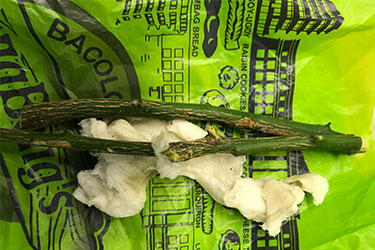 Biosecurity officers uncovered citrus budwood in the inner tubing of a tyre.
Biosecurity officers uncovered citrus budwood in the inner tubing of a tyre.Biosecurity officers recently uncovered a significant plant risk at Brisbane Airport, after a passenger was found to be carrying concealed citrus budwood in the inner tubing of a tyre.
Head of Plant Biosecurity at the Department of Agriculture and Water Resources, Dr Marion Healy, said the passenger did not declare the plant material and will face further enforcement action.
“This was a direct attempt to try and circumvent our biosecurity system and yet another example of the great work undertaken by our officers on the frontline to manage that risk,” Dr Healy said.
Continue reading about Smuggled plant puts Australia's citrus industry at risk
“When searching the passenger’s baggage, officers located a tyre with an inner tube that was secured with tape. The officers removed the tape and inner tube and discovered a single budwood stick, which has since been identified as cumquat.
“If people incorrectly import plant material to Australia, it can harbour pests and diseases that can directly impact our horticultural industries, environment and market access, but can also indirectly lead to more expensive food or shortages of some products.
“What makes this case even more shocking was that the department identified that the passenger is employed in a horticulture sector that was significantly impacted by the 2004 outbreak of citrus canker in Emerald.
“The fact that this passenger has put his own industry, as well as the whole of Australia, at risk is both unbelievable and disappointing.”
The case has been referred to the department’s enforcement section for further investigation and is a stern warning to those who try to sidestep our strict biosecurity requirements.
Australia has strict import conditions for plants and plant products, which manage associated biosecurity risks. The conditions outline what plants and plant products can be imported to Australia and how they can be imported safely.
Import conditions apply to both commercial imports and personal consignments including items in the mail or international passengers’ baggage.
Our biosecurity officers work around-the-clock to enforce Australia’s strict biosecurity border controls and safeguard the nation from pests and diseases present in other countries.
Find out more about Australia’s biosecurity conditions and what can and can't be brought to Australia from overseas.
A fond farewell for Andy
 Andy in uniform at Adelaide airport.
Andy in uniform at Adelaide airport.After nine years of dedicated service, biosecurity detector dog Andy has retired with a special celebration at Adelaide airport in May. Andy’s retirement party included guest speakers, cake, and a great deal of fanfare.
As a detector dog protecting Australia’s biosecurity, Andy has seen a lot during his nine year career. He has worked at Sydney, Brisbane, Gold Coast and Adelaide airports and sniffed out a staggering 2.3 tonnes of biosecurity risk material that travellers failed to declare. This has included 718 kilograms of undeclared fresh fruit and vegetables, 432 kilograms of meat and 80 detections of viable seeds and live plants.
“Andy has certainly had his fair share of finds at the airport,” said Phil Carter, of the Department of Agriculture and Water Resources Inspection Services Group.
Continue reading about a fond farewell for Andy
“He’s been a much loved part of the team at Adelaide airport for over a year and most recently has spent time working for Primary Industries and Regions SA (PIRSA) on their fruit fly campaign,” Phil said.
The department’s detector dogs are trained to find items that could bring pests or diseases into the country such as certain food, plant material and animal products. They have a working life of about six to eight years and, on average, find between 3,000 and 3,500 biosecurity risk items during this time. Andy’s nine year tenure has made a massive contribution to Australia’s biosecurity.
“Andy’s drive and determination have never waned and he has been a first class detector dog,” Phil said.
“While we are always sad to say goodbye to one of our colleagues, we all wish Andy a long and relaxing retirement.”
Andy is now living back in Sydney with his original handler and enjoying all the good things retirement has to offer.
Find out more about Detector Dogs.
Working with New Zealand to boost biosecurity

Former New Zealand cricketer Chris Cairns (left) hosted the opening Innovation keynote discussion with America’s Cup sailors Sam Newton (centre) and Kyle Langford (right).
Imagine if we could use bionic noses to sniff out insect pests in containers. Imagine one rapid test to detect plant diseases of concern in cuttings, or machines that can be used to help make smart, risk-based biosecurity decisions.
These were some of the ideas discussed at the inaugural Biosecurity Innovation Exchange in Canberra in March.
The event, held in partnership with the New Zealand Ministry for Primary Industries, brought together innovators from both countries to talk about biosecurity technologies and approaches, and share ideas.
Australia and New Zealand face similar biosecurity challenges. It makes sense to share our knowledge and help each other identify opportunities. Together, we’re leading the future of biosecurity.
Continue reading about working with New Zealand to boost biosecurity
The volume of people and goods entering Australia is set to double by 2025, bringing with it increased biosecurity risks and other challenges.
“Australia has a strong, world-class biosecurity system, but increasing trade and passenger movements, as well as more complex supply chains, present significant challenges,” Deputy Secretary, Lyn O’Connell, said.
“Our strong biosecurity system safeguards our industries, environment and economies from the threat of exotic pests, diseases and weeds. However, we know we can’t do it alone.
“Through innovation, science and research we can continue to be world leaders in biosecurity – and the best way for us to harness these opportunities is to collaborate with other countries who share our innovative biosecurity vision.
“We value our relationship with our New Zealand counterparts and through the Exchange we are working together to strengthen our biosecurity systems.”
Since the Exchange, our countries have been working together to progress key initiatives, including gamification to engage the community with biosecurity.
A workshop was held recently to explore the potential of QuestaGame, an interactive game that encourages community players to snap images of over 8 million species of fauna and flora, upload the images with relevant metadata and connect with experts to identify species. Apps like QuestaGame could provide new ways to harness community eyes to help identify and report potential biosecurity threats.
Find out more about Australia’s biosecurity system.
Border finds: not so sweet fruit
 When the officers examined the pomegranates, they observed visible symptoms on the surface of the fruit.
When the officers examined the pomegranates, they observed visible symptoms on the surface of the fruit.Biosecurity officers at Adelaide Airport recently uncovered a not-so-sweet surprise when they inspected the luggage of a passenger who had just arrived from India.
During the inspection, officers detected pomegranates and other fruit inside. While examining the pomegranates, the officers could see visible symptoms on the surface of the fruit. They suspected it was infected with the plant disease Sphaceloma punicae—known as Pomegranate scab.
A live mealy bug was also found on one of the pomegranates. When the officers took a closer look, they found the mealy bug was infected by an unknown wasp parasitoid larva.
Because the passenger had not declared the fruit prior to inspection, an infringement notice was issued.
If you’re overseas, it’s important to check that items comply with Australia’s biosecurity requirements before mailing them or bringing them home in your luggage.
For more information visit Travelling or sending goods to Australia.
Border finds: a jar of honey gets our biosecurity officers buzzing
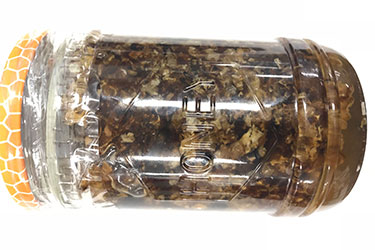 When biosecurity officers examined the jar, it was found to contain more bee and comb debris than actual honey.
When biosecurity officers examined the jar, it was found to contain more bee and comb debris than actual honey.Biosecurity officers at Sydney Airport were recently confronted with an unusual find when they inspected the luggage of a passenger returning from Iraq.
While overseas, the passenger had purchased a jar of local honey, which they declared to the biosecurity officers upon arrival. When it came time to inspect the contents of the jar itself though, the officers got an unexpected surprise.
After examining the jar, the officers discovered that the contents contained far more bee and comb debris than actual honey. The officers explained the biosecurity risks that were associated with the materials contaminating the honey to the passenger, who then surrendered the item for destruction.
Exotic honey bee material, such as comb debris, has the potential to introduce pests and diseases into Australia that could harm our local honey and other agricultural industries, as well as our natural environment.
Remember to check your luggage when packing for Australia.
For more information about protecting Australia from the world’s most severe pests and diseases, and protecting our unique environment, visit our page about travelling or sending goods to Australia.
Don't be sorry, just declare it
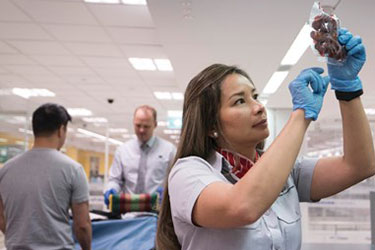 Biosecurity officers take the lead in the department’s new video for travellers.
Biosecurity officers take the lead in the department’s new video for travellers.Australia’s biosecurity officers are helping international passengers understand and meet their biosecurity obligations when coming into Australia.
More than 21 million passengers are screened for biosecurity risk material each year at Australian airports and this number is expected to grow significantly.
With international travel projected to increase by five per cent every year, the Department of Agriculture and Water Resources is rolling out an inflight video with a clear message for travellers.
The video tells passengers, ‘Don’t be sorry, just declare it.’
Continue reading about don't be sorry, just declare it
While the message is serious, the video uses humour to engage passengers and demonstrate the important responsibilities we all have around Australia’s biosecurity. Eight of our biosecurity officers take lead roles in the three versions of the video.
The video has been filmed in English, Mandarin and Hindi.
By looking at new ways to engage passengers, and influence their knowledge and behaviour, the department hopes to promote compliance with Australia’s biosecurity rules.
You can watch the ‘Don’t Be Sorry’ video on the department's YouTube channel.
Get Grubby TV stars recruit new Biosecurity Champions in the Torres Strait
 Get Grubby TV stars Costa the Garden Gnome and Dirtgirl, along with some of our Northern Australia Quarantine Strategy (NAQS) staff, are featured in the video.
Get Grubby TV stars Costa the Garden Gnome and Dirtgirl, along with some of our Northern Australia Quarantine Strategy (NAQS) staff, are featured in the video.Two ABC TV family favourites have been enlisted to show travellers how they can become biosecurity champions by putting their fresh fruit in bins and declaring high risk items.
Get Grubby TV stars Costa the Garden Gnome and Dirtgirl, along with some Northern Australia Quarantine Strategy (NAQS) staff, are featured in a new video reminding travellers in the Torres Strait about the importance of stopping the spread of fruit flies.
Danny Mosby from the department’s NAQS Community Engagement team, says that he hopes the video will have a big impact on raising awareness of the unique biosecurity issues facing the Torres Strait.
Continue reading about Get Grubby TV stars recruit new Biosecurity Champions in the Torres Strait
“Working with local communities and visitors in the Torres Strait and Northern Peninsula area is very important in stopping exotic fruit flies from spreading,” Danny said.
“The Torres Strait is a high risk pathway for biosecurity threats, so effective collaboration between government and communities is critical for protecting the region, the state and the rest of Australia.”
“Big eso (thank you) to everyone involved — like we say, biosecurity is everyone’s business”, Danny said.
The video also features Indigenous biosecurity trainees and officers inspecting ferry passengers arriving at Seisia in Cape York and at Horn Island airport.
The video is part of a broader package aimed at increasing community biosecurity awareness — watch this space for more exciting videos showcasing the northern region.
Improving animal health surveillance
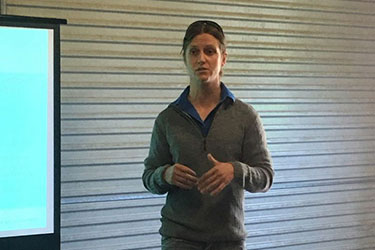 NSW Local Land Service vet Kate Sawford speaking to Capital Region Small Farms Network members about livestock disease.
NSW Local Land Service vet Kate Sawford speaking to Capital Region Small Farms Network members about livestock disease.The Department of Agriculture and Water Resources is supporting a range of animal health surveillance projects in 2018 with government and industry partners in New South Wales (NSW), Western Australia, South Australia, Queensland and Tasmania. These projects will help producers to better detect, understand and report changes in livestock health.
Under this initiative two workshops were delivered in May in NSW with the NSW Department of Primary Industries, one in Murrumbateman and one in Camden. The workshops, hosted by the Small Farms Network, used presentations from vets, butchers and other speakers to teach participants about animal disease identification and reporting. They were also provided with practical skills and ideas for managing farm biosecurity and minimising disease.
Continue reading about improving animal health surveillance
Workshop participants were invited to remain in contact post-workshop through the Small Farms Network, to enable them to seek disease management advice and report any changes in livestock health to surveillance champions.
The department is committed to improving animal disease identification, management and reporting and improving the quality of agricultural outputs through industry education and training.
This project was funded under the Australian Governments Agricultural Competitiveness White Paper, the government’s plan for stronger farmers and a stronger economy.Top 40 biosecurity message spreads to Australia's Indian Ocean Territories
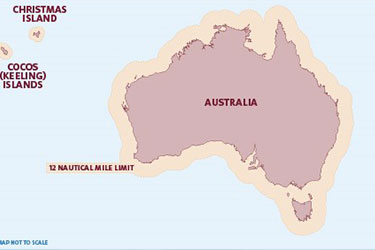 Australia’s External Territories are covered by the Biosecurity Act 2015.
Australia’s External Territories are covered by the Biosecurity Act 2015.Scientists from the Department of Agriculture and Water Resources recently travelled to the far flung Indian Ocean Territories to undertake the first plant health survey in the region in 17 years.
The survey took the national priority plant pests focus to the Christmas and Cocos (Keeling) Islands, as part of work to strengthen biosecurity surveillance and analysis under the Agricultural Competitiveness White Paper.
Although closer to Indonesia than the Australian mainland, the islands are Australian External Territories. The Department of Agriculture and Water Resources is responsible for their biosecurity, such as screening cargo and airline passengers.
Continue reading about top 40 biosecurity message spreads to Australia's Indian Ocean Territories
The focus of the April survey was on plant pests, diseases and weeds found on the Northern Australia Quarantine Strategy (NAQS) Plant Health Target and the National Priority Plant Pests lists. This included the ‘top 40’ exotic and unwanted plant pests, according to Senior Entomologist, Luke Halling.
“Our survey team comprised staff from both Operational Science Services (OSS) and NAQS, and covered the disciplines of entomology, botany and plant pathology,” Luke said.
“Plant health surveillance covered ports and inspection of some international imports, as well as farms, home gardens, research centres and public spaces.
“There was a lot of interaction with, and support from, our locally-based staff and other organisations, as well as members of the public.”
Susie Collins, Director of Plant Health Surveillance and Diagnostic Programs, added “Through the White Paper, we are working to build a new, improved national surveillance system—and our External Territories are part of this effort.
“Understanding the biosecurity status of our nation, and encouraging communities to monitor and report biosecurity risks, will be one of the lasting legacies of the White Paper investment.”
This project is supported by funding from the Agricultural Competitiveness White Paper.
Working with our less cooperative clients
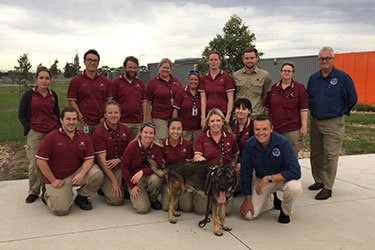
The team at Mickleham PEQ recently underwent specialised dog handling training, delivered by Dog Force Australia.
Our dedicated team at the Post Entry Quarantine (PEQ) facility in Mickleham, Victoria, deal with thousands of dogs each year. The dogs are often imported into Australia as companion animals, or for breeding, showing, military or special services.
Unfortunately though, some new arrivals are less cooperative than others.
For this reason, the team at Mickleham PEQ recently underwent specialised dog handling training, delivered by Dog Force Australia. The training was aimed at improving skills and knowledge for staff who handle difficult or temperamental dogs.
Continue reading about working with our less cooperative clients
The PEQ team deals with dogs of varying size, breed and temperament. Dog Force Australia’s training is designed to help staff deal with the challenges by improving safe handling practices.
The training was split up into theory-based and practical learning, and included the following:
- Methods of dog communication.
- Behavioural characteristics of dogs.
- Types of canine aggression and factors which influence aggressive behaviour.
- Understanding dog body language and vocalisation.
- Breed identification (including restricted dog breeds).
- Safe dog handling and restraint techniques.
- Responding to aggressive dogs.
- Controlling the environment and reducing risk.
- Work Health Safety Practices and Risk Assessments of dangerous dogs.
- Dog transport and housing requirements.
"Upskilling staff and expanding knowledge is vital when working with animals" said Tina Ricci, Manager Dog/Cat Operations – PEQ Mickleham.
Find out more about activities happening at our Mickleham PEQ facility.
Find out more information on bringing cats and dogs to Australia.We want your input

The department is currently seeking feedback on:
- the content of a new National Biosecurity Statement
- the draft Australian Priority Marine Pest List (APMPL).
See the latest Import industry advice notices or Export industry and market access notices.
